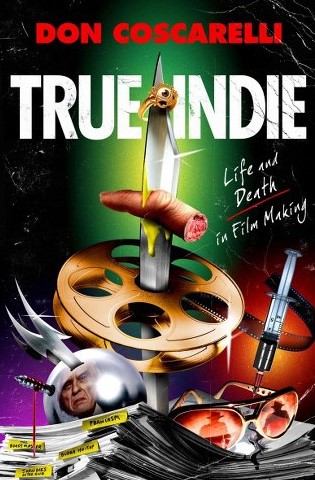 By DON COSCARELLI (St. Martin’s Press; 2018)
By DON COSCARELLI (St. Martin’s Press; 2018)
Don Coscarelli is the writer-director of PHANTASM, THE BEASTMASTER, BUBBA HO-TEP and seven other features. If that output sounds a bit unprolific given the fact that Coscarelli’s filmmaking career spans 40-plus years, it just goes to prove that this guy is indeed a “true indie,” working in an industry where funding is hard to come by and longevity even harder.
TRUE INDIE is Coscarelli’s long-in-coming autobiography, and it’s a good one. The focus is on his filmmaking endeavors, with his personal life and political convictions kept mercifully off-stage. That laser-sharp focus, in fact, is the book’s primary virtue. It tells us exactly what we want to know about Coscarelli and his films, never belaboring its points or presenting its author/subject as anything more than what he is: an affable and unpretentious fellow trying to make quality genre films against seemingly unsurmountable odds.
Coscarelli’s filmmaking odyssey began in the early 1970s, when as a teenager he began making short films. This led to the feature-length teen drama JIM THE WORLD’S GREATEST, released by Universal Pictures in 1975, when Coscarelli was 19. He followed it up the following year with another teen pic, KENNY AND COMPANY. Neither film was a success, so Coscarelli elected to turn to more marketable fare—specifically: “I loved horror films + horror films make money = I will make a horror film. Simple arithmetic.” The result was 1979’s iconic PHANTASM, which remains Coscarelli’s signature achievement.
The film’s success, alas, didn’t make things easier for Coscarelli. Survival in the independent film sphere is always difficult, as proven by the many stalled projects Coscarelli pursued in the 1980s (including an early pass at the Stephen King adaptation SILVER BULLET), during which he only managed to complete two features: 1982’s THE BEASTMASTER, which suffered artistic interference by its executive producer, and 1988’s PHANTASM II, a rare sojourn into big studio territory that was likewise marred by meddling from without.
The 1990s weren’t much brighter, with Coscarelli turning out two straight-to-video PHANTASM sequels and the quickly forgotten outdoor adventure flick SURVIVAL QUEST. An unexpected high point occurred in 2003, with the release of Coscarelli’s Joe Lansdale adapted Elvis-versus-an-extraterrestrial-mummy flick BUBBA HO-TEP, although its distribution, shepherded by Coscarelli himself, was quite arduous. It was set to be followed by a sequel entitled BUBBA NOSFERATU, but that project eventually joined the legions of unmade Coscarelli efforts. His final film as of this writing is 2013’s JOHN DIES AT THE END, which (for me at least) was a less-than-worthy follow-up to BUBBA HO-TEP.
Frankness is one of this book’s virtues. A nice guy Coscarelli may be, but he’s brutally honest about his foibles, and those of others. He freely admits that many of THE BEASTMASTER’S production headaches came about due to his own gullible nature, while also slamming that film’s star Marc Singer, with whom Coscarelli “did not quite click,” and who physically assaulted him on two occasions. Also knocked is BUBBA HO-TEP star Bruce Campbell, whose changing moods, Coscarelli claims, were the primary reason BUBBA NOSFERATU was never made, while SILVER BULLET’s late producer Dino de Laurentiis is dismissed as “clueless.”
Name dropping? Yes, there’s plenty to be found here, with Mr. T (who auditioned for THE BEASTMASTER), Francis Ford Coppola (who solicited an interview by Coscarelli for a never-published book), Peter Weir (who invited Coscarelli into his home during an Australian sojourn), Demi Moore (who was at one point set to be the female lead in THE BEASTMASTER), Brad Pitt (who auditioned for PHANTASM 2), J.J. Abrams (who shelled out to have PHANTASM restored) and Quentin Tarantino (who has little bearing in Coscarelli’s affairs but is nonetheless mentioned quite frequently) all getting generous coverage.
TRUE INDIE is worthwhile reading both for PHANTASM fans and those interested in independent filmmaking, being gossipy, informative and, best of all, damned entertaining. It is, in short, a lot like one of Mr. Coscarelli’s better films.
